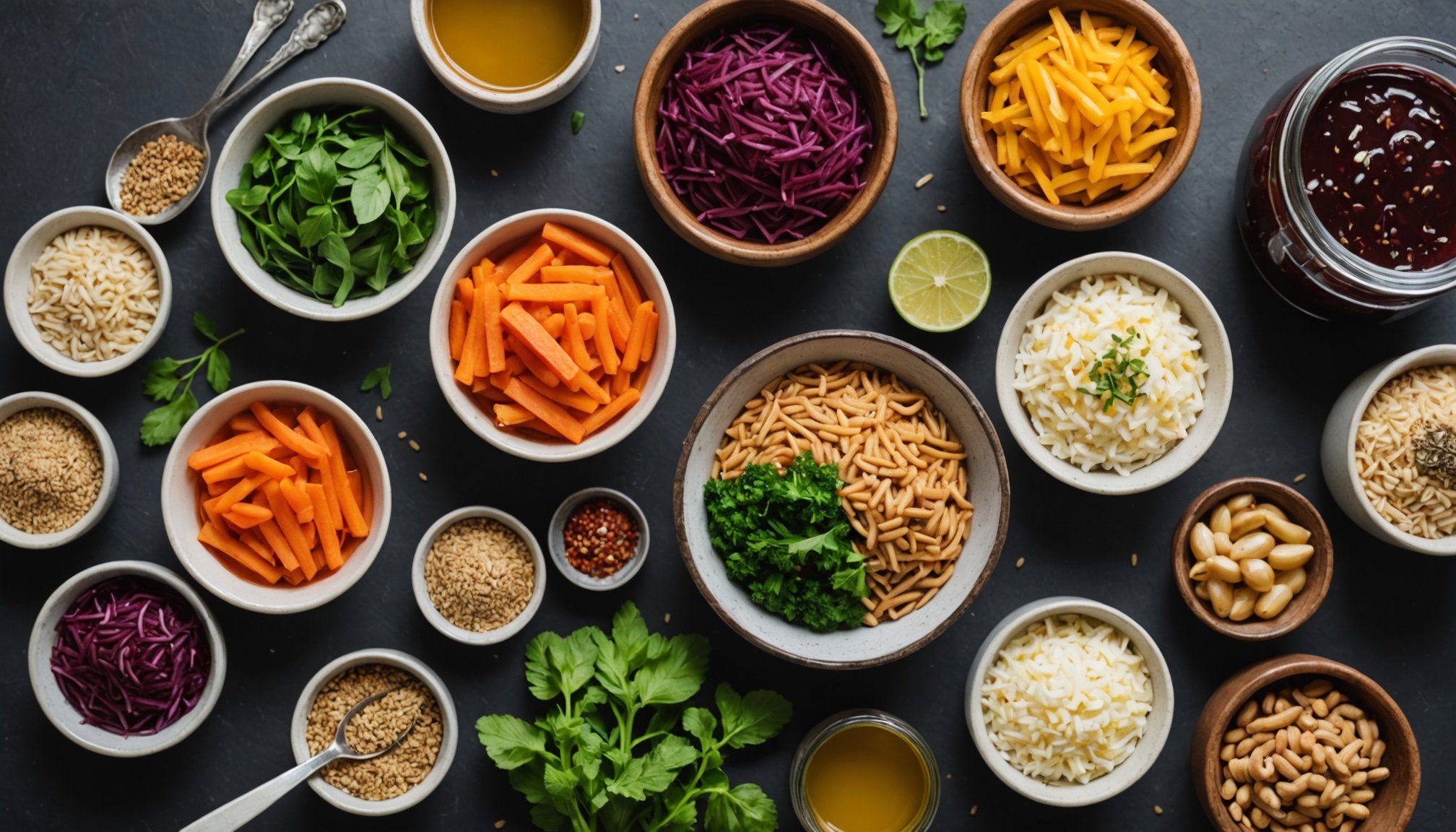Unlocking Optimal Gut Health: Top Fermented Food Strategies for UK Residents
Understanding the Importance of Gut Health
When it comes to overall health, the gut plays a crucial role that often goes underappreciated. The gut, often referred to as the “second brain,” is home to a vast array of microbes that influence not just our digestive health, but also our immune system, mental well-being, and even our skin. Here’s why gut health is so vital and how fermented foods can be your best allies.
“Gut health is where it starts,” says Joy Skipper, a nutritionist. “If your gut isn’t working, you’re not going to absorb any nutrients and the chances are that other things aren’t going to be working properly, as everything works together.”[1]
This might interest you : Mastering Meal Prep: A Busy UK Parent’s Ultimate Guide to Time Management
The Role of Fermented Foods in Gut Health
Fermented foods are a rich source of probiotics, which are live bacteria that provide health benefits when consumed in adequate amounts. These foods have been around for centuries, long before the advent of refrigeration, as a way to preserve food through lacto-fermentation.
How Fermentation Works
The fermentation process involves the action of beneficial bacteria and yeasts that break down the sugars in food, producing lactic acid and other compounds that enhance the nutritional value of the food. This process not only preserves the food but also increases its vitamin and mineral content.
This might interest you : Unlocking Wellness: Exploring the Lasting Health Advantages of the Mediterranean Diet for UK Residents
Top Fermented Foods for Gut Health
Here are some of the best fermented foods you can include in your diet to support your gut health:
-
Yogurt: Made from fermented milk, yogurt is rich in Lactobacillus acidophilus, a probiotic commonly found in Greek, Icelandic, and other types of yogurt. Ensure the label includes “live and active cultures” to guarantee the presence of probiotic cultures[2].
-
Ways to Include in Your Diet: Enjoy yogurt with fruits or cereal for breakfast, use it as a topping for salads or savory dishes, or make your own yogurt at home.
-
Kefir: A drinking-style yogurt popular in Europe, kefir is fermented with around a dozen or more bacteria and yeasts, making it a great source of probiotics. It can be dairy or soy-based and is excellent as a breakfast smoothie blended with flaxseeds, ginger, and pineapple[1].
-
Ways to Include in Your Diet: Use kefir in overnight oats, as a base for smoothies, or as a substitute for regular yogurt.
-
Sauerkraut: A type of fermented cabbage, sauerkraut combines salty and sour flavors and is rich in beneficial bacteria. Ensure you buy sauerkraut that has not been pasteurized and is refrigerated to maintain its probiotic content[2].
-
Ways to Include in Your Diet: Add sauerkraut to sandwiches, wraps, salads, soups, or stews. It also pairs well as a side dish with meat, fish, or vegetables.
-
Miso: Fermented soybean paste, miso is great as a side soup, stock, or in dressings. Look for miso that has been fermented for at least six months for the best gut health benefits[1].
-
Ways to Include in Your Diet: Use miso in soups, stir-fries, or as a seasoning for vegetables.
-
Sourdough Bread: Made from a culture of yeasts and beneficial bacteria, sourdough bread is easier to digest due to the long fermentation period that breaks down carbohydrates and gluten. This makes it a good option even for those with gluten intolerance[1].
-
Ways to Include in Your Diet: Enjoy sourdough bread as a healthier alternative to regular bread, or use it to make sandwiches and toast.
How Often Should You Eat Fermented Foods?
To reap the benefits of fermented foods, it’s important to incorporate them into your diet consistently. Here are some tips on how to do it effectively:
-
Daily Consumption: Bahee Van de Bor, a registered dietician, recommends consuming small amounts of fermented foods daily. “Rather than indulging in large quantities sporadically, the key is incorporating fermented options into your diet consistently,” she advises[2].
-
Start Low and Slow: For those with sensitive digestive systems, start with small servings and gradually increase the amount over several days or weeks to avoid discomfort such as gas and bloating[2].
Benefits of Fermented Foods Beyond Gut Health
While the primary focus is on gut health, fermented foods offer a myriad of other health benefits.
Immune System Support
Almost 80% of our immune system is found in our digestive tract. Fermented foods help restore good bacteria levels, which can be depleted by antibiotics, processed foods, sugar, and artificial sweeteners. This support to the immune system is crucial for overall health[1].
Mental Health and Cognitive Performance
The microbiota-gut-brain axis is a well-documented connection that shows how gut health influences mental well-being. Probiotics in fermented foods have been shown to support brain function and reduce symptoms of depression and anxiety[2].
Skin Health
A healthy gut microbiome is linked to glowing skin. The beneficial bacteria in fermented foods help reduce inflammation and improve the overall health of the skin, making it look more radiant and healthy[4].
Weight Loss
Fermented foods can also aid in weight loss by improving digestion and metabolism. A balanced gut microbiome helps in better nutrient absorption and can support a healthier weight[5].
Potential Risks and Side Effects
While fermented foods are generally safe, there are some considerations to keep in mind:
-
Allergic Reactions: Some individuals may experience allergic reactions to ingredients like soybeans or grains used in fermentation[2].
-
Histamine Intolerance: Fermented foods can be high in histamine, which may cause adverse reactions in individuals with histamine intolerance[2].
-
Digestive Discomfort: Starting with fermented foods can cause temporary discomfort such as gas and bloating as the gut adjusts to the new bacteria. Starting with small servings and gradually increasing the amount can help mitigate these effects[2].
Shop-Bought vs Homemade Fermented Foods
While shop-bought fermented foods are convenient and consistent, homemade versions often offer more benefits.
Advantages of Homemade Fermented Foods
-
More Bacterial Strains: Homemade fermented foods tend to contain a wider variety of bacterial strains compared to shop-bought versions[3].
-
Better Taste and Control: Making your own fermented foods allows you to tweak the recipe to your taste preferences and control the fermentation process to achieve the desired flavor[3].
Practical Tips for Incorporating Fermented Foods into Your Diet
Here are some practical tips to help you get started:
-
Start Simple: Begin with easily accessible fermented foods like yogurt and sauerkraut. Gradually introduce more varieties into your diet.
-
Experiment with Recipes: Try out different recipes that incorporate fermented foods. For example, use kefir in smoothies, add sauerkraut to salads, or use miso in soups.
-
Check Labels: Ensure that the fermented foods you buy contain “live” or “active cultures” to guarantee the presence of beneficial bacteria[2].
Incorporating fermented foods into your diet is a simple yet powerful way to support your gut health and overall well-being. With their rich probiotic content, these foods can help improve digestion, boost your immune system, enhance mental health, and even support weight loss and glowing skin.
As Dr. Maria Valdivia-Garcia from Imperial College London notes, “The wider health benefits of fermented food only become apparent after six months of incorporating them regularly into your diet, but the digestive benefits will be felt much sooner.”[3]
So, take the first step today by adding these fermented foods to your diet. Your gut, and the rest of your body, will thank you.
Detailed List of Fermented Foods and Their Benefits
Here is a detailed list of some of the top fermented foods and their health benefits:
-
Yogurt
-
Rich in Lactobacillus acidophilus
-
Supports digestion and gut health
-
Can be used in various recipes like smoothies, salads, and as a topping[2]
-
Kefir
-
Contains multiple bacterial strains and yeasts
-
Supports gut health and mental well-being
-
Can be used in smoothies, overnight oats, and as a substitute for yogurt[1]
-
Sauerkraut
-
Made from fermented cabbage
-
Rich in beneficial bacteria
-
Reduces inflammation and supports gut health
-
Can be added to sandwiches, salads, and as a side dish[2]
-
Miso
-
Fermented soybean paste
-
Supports gut health and immune system
-
Can be used in soups, stir-fries, and as a seasoning[1]
-
Sourdough Bread
-
Made from a culture of yeasts and beneficial bacteria
-
Easier to digest due to long fermentation period
-
Supports gut health and can be a good option for those with gluten intolerance[1]
-
Kimchi
-
Fermented Korean dish made from vegetables
-
Rich in beneficial bacteria and vitamins
-
Supports gut health and immune system
-
Can be used as a side dish or added to various recipes[3]
-
Kombucha
-
Fermented tea drink
-
Contains gut-friendly live cultures
-
Supports gut health and immune system
-
Should be chosen carefully to avoid high sugar content and artificial sweeteners[4]
-
Cheese
-
Aged cheeses contain beneficial bacteria
-
Supports gut health and immune system
-
Can be used in various recipes like sandwiches and salads[4]
Table: Comparison of Key Fermented Foods
| Fermented Food | Key Benefits | Ways to Include in Diet |
|---|---|---|
| Yogurt | Rich in Lactobacillus acidophilus, supports digestion and gut health | Use in smoothies, salads, as a topping |
| Kefir | Contains multiple bacterial strains and yeasts, supports gut health and mental well-being | Use in smoothies, overnight oats, as a substitute for yogurt |
| Sauerkraut | Made from fermented cabbage, rich in beneficial bacteria, reduces inflammation | Add to sandwiches, salads, as a side dish |
| Miso | Fermented soybean paste, supports gut health and immune system | Use in soups, stir-fries, as a seasoning |
| Sourdough Bread | Made from a culture of yeasts and beneficial bacteria, easier to digest | Use as a healthier alternative to regular bread |
| Kimchi | Fermented Korean dish made from vegetables, rich in beneficial bacteria and vitamins | Use as a side dish or add to various recipes |
| Kombucha | Fermented tea drink, contains gut-friendly live cultures | Choose carefully to avoid high sugar content and artificial sweeteners |
| Cheese | Aged cheeses contain beneficial bacteria, supports gut health and immune system | Use in various recipes like sandwiches and salads |
By incorporating these fermented foods into your diet and following the practical tips outlined above, you can take a significant step towards achieving optimal gut health and overall well-being.










